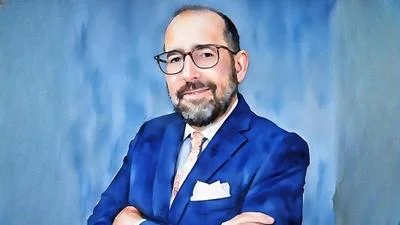Charlie Sauer is the President and Founder of the Market Institute, a non-profit organization that specializes in simplifying complex issues. He began his career working for the Senate Finance Committee.
The following has been edited for context and clarity.
Federal Newswire:
What is the Market Institute?
Charlie Sauer:
The Market Institute is a 501c4 nonprofit, and what that allows us to do is educate, but also carry a baseball bat on our shoulders. So when we need to be aggressive, we can be aggressive.
The thing that we're good at is taking nerd speak and taking academic writing and making it messageable, [then] taking it onto Capitol Hill so that the staffers understand what's being said in these academic papers.
Federal Newswire:
When was the Market Institute founded?
Charlie Sauer:
The Market Institute was founded in 2009. It was after I worked for a think tank for a little while and I just looked around and saw that there was nobody that was really this important working for the small businesses on Capitol Hill. Now there's small business organizations all around. They tend to focus more on campaigns. Or they have large corporate donors. And so they have this small businesses as members, but they're really focused on large corporate policy, which is fine.
But I wanted to represent Main Street on Capitol Hill. And it turns out that as a starting business owner a lot of small businesses didn't really know what to do with me. And so I ended up working with associations and they're the groups that put out a lot of the nerdy writing for Capitol Hill staff.
Federal Newswire:
How has intellectual property and the patent system changed over the last decade and a half?
Charlie Sauer:
I'm going to take this one back to my mom because I want to start there. My parents were divorced. So I had a single mom. Being a single mom is hard. And so at one point she was stressed, I think we were coming onto the holiday season and she's like, you know what, somebody invented a pet rock and [got] rich. I can come up with something that's better than a pet rock.
So she created the All Ball, it was a baseball-football, it was about the size of a baseball. It had red stitching like a baseball, but it was shaped like a football with interesting bean bag material inside of it. And to get that done, she had the idea, she filed the patent, she filed the trademark, and she flew to China to get the manufacturing set. She was able to get that product onto the store shelves of Walmart, which was amazing for a single mom to just believe she could do it. And get it done.
Now we didn't get rich off of the All Ball, but I was able to see what was possible when you have an idea. So we fast forward to Capitol Hill and I grew up around these entrepreneurs. And when I started the Market Institute, one of my friends called me up and they said, you're not going to believe what kind of bill they're working on on Capitol Hill. They're working on a bill that's going to change the U.S. from “first to invent” to “first to file.” First to invent means that a garage inventor can have an idea and put it in their notebook and have basic ownership of that idea until they get it ready to go to the patent office. First to file means that the company with the most lawyers on staff who can file the most patents is going to be in the lead. So now it's not first to invent … the next best mousetrap. It's the first to … rush down to the patent office.
Federal Newswire:
So someone could hear an idea and because they would file first, they would get a patent on it?
Charlie Sauer:
That's true. But another way to think about this is, [imagine] that your daughter has an invention. To get a patent that is defensible is going to be somewhere around 20 grand to actually file the patent and have the lawyer do the correct research and write up the patent in a way that you can defend it.
Now if you are Apple and you have a bunch of lawyers on staff, the longer they sit there without filing a patent, the more expensive each patent that they file becomes. So if a lawyer files one patent a year, that patent costs you, let's call it $200,000. But if that same lawyer files 20 patents a year, each patent only costs you $10,000. They're sitting at a desk. The more work they do, the less expensive they are as an employee. And so it reduces the cost for the big guys. While the little guys still have the same cost,
Federal Newswire:
Is this the issue of economies of scale? This difference between small business regulatory impacts and big business regulatory impacts?
Charlie Sauer:
Not only what you said is true, but it has this multiplier effect that is the problem. That's how I got started in the patent system.
We were talking about these issues. But the bill… made it harder. They created a kangaroo court for inventors. They tried to make it so that medium-size businesses weren't going to be able to file. They started to make it so that if an invention infringed, only the piece of the product that infringed was liable, which is its own problem. If there are infringing products in this computer, you could only sue the chip manufacturer, not the actual manufacturer of the computer. Now, the reason this happens, and this makes complete sense to me, is that businesses see technology as a cost, and so they want to figure out how to reduce their cost of doing business. And so instead of working harder and making more technology themselves, they just go up to Capitol Hill and they make patents less effective. Less defensible. That's what I've been dealing with on Capitol Hill for the last decade, but we've been dealing with it as a country for really the past 15 years.
Federal Newswire:
Can you talk about the problems that are created by China making its economy off of ideas from other people?
Charlie Sauer:
What's interesting, when China went through their cultural revolution in the late seventies, one of the first things that they did was actually give people the ability to file patents. They gave this as one of the first rights that they handed back to people–their own intellectual property. Which is also the same right that our founders gave us. The actual right in the Constitution or in the original constitution, Article one, Section eight is the right to a patent. And so our founders knew the importance of this,
Federal Newswire:
Why is it important to have that right to exclusivity?
Charlie Sauer:
I recently did a video where I put two buckets in front of people. The first set of buckets was a $5 bucket right in front of them and a $5 bucket 10 feet out. And I handed them a ping pong ball and I said whichever bucket you want to throw it into, if you make it, I'll give you the money.
So there was one guy that went for the 10 foot one, but every other person put it in the $5 bucket right at their feet. So then I changed up the scenario and I put a $5 bucket at their feet and a $10 bucket 10 feet out. And I handed them the ping pong ball, and then 60-70% of the people shot for the $10 bucket. And the point is that incentives matter. So without the ability to have intellectual property, without the ability to have something that you defend, then you don't have the incentive to invest in it.
Federal Newswire:
Can you go into more detail on China and property ownership over there?
Charlie Sauer:
China saw this and while they've been expanding their intellectual property base; in the US we've been shrinking ours. So where do we see our entrepreneurs and investors moving? They're moving to China.
China's economy was largely based on mimicking everything in the U.S. Now they're starting to beat us and move ahead. And the problem here is that there's a long tail before you even see the beginning of what intellectual property or innovation brings. Because, you know, you have an idea for, let's say 5G today, that's several years away from deployment. And the beginning deployment doesn't matter. So when China steps ahead of us, it means that they're going to be ahead not just for a year. They're going to be ahead for decades. And that's where not only do we need to fight China's taking of U.S. intellectual property, but we need to have offense instead of defense. The offense is not weakening our patent rights. It's making them stronger so that there's a bigger incentive.
If I would've put 10 grand [in the bucket] out there everybody would've taken the risk. That's what we need to do for U.S. innovation.
Federal Newswire:
Square created this device you could plug into your headphone jack on your phone. But if you plug it in through the USB port at the bottom then you would have to get approved. Do you think this is why we no longer have analog 2.5 millimeter headphones jacks on most phones?
Charlie Sauer:
That's a part of it. I believe that they're saving real estate. I think that you get better data connections over the other. But at the same time, I think all of those guys have now gone through the system and are in the app stores. I think one of the things you see is the permissionless innovation, which is done when you push back against government the way that Uber did. I support that.
But when you have it where you're pushing back against businesses, I think that there's something a little bit different, especially when you're doing it at scale. Some small guys might repackage a product to see if something will work for a little while. But when you're doing it at a large corporate scale I'm not sure how I feel about that because that is running against others.
Federal Newswire:
Property rights and intellectual property rights are the same. Who's trying to weaken these property rights?
Charlie Sauer:
A lot of the large tech companies are trying it. We have Google, we have Apple. Those are the big ones.
Federal Newswire:
Google has digitized a bunch of books, but they can't just do that because there's a patent and there's copyright. Is this a violation of the copyright side of things?
Charlie Sauer:
I will say in intellectual property, copyright law is the one that still confounds me. I love intellectual property and I believe that people should be able to get a copyright. I'm still unsure about the amount of years people can keep copyrights for. I'm open to hearing the debates about it though, because again, I support this.
The nice thing about a patent, when a drug company comes up with a new drug, they get that patent for 20 years. Now there's conversations that could even be longer or should be longer because it actually takes sometimes 10, 11 years to get to market. So they only have 10 years to make their money back. And so that's one of the reasons we see higher drug prices. So maybe they should have 20 years after the government approves it. I don't know.
Federal Newswire:
Do you believe there needs to be a balance between the period of exclusivity and the ability of others to innovate?
Charlie Sauer:
If you tell me to spend 2 billion dollars to come up with an idea and then somebody else can steal it and you can't do anything about it, I'm not going to spend the 2 billion. I'm going to put it in the bank and then I'm going to go live on my yacht. While, you know, everything else burns down.
Federal Newswire:
Why is it so hard to prove infringement?
Charlie Sauer:
Well, why is it so hard to get injunctions once infringement is approved? Injunctions are a two-step process. Injunctions have gone off the rails. When somebody comes onto your property [or is] in your house at night you call the police. And hopefully they show up in time. They go ahead and they take the guy out of the house and lock him up and you're good.
[if an inventor] walks into a store and sees somebody selling his exact product, here's nobody to call. What does he have to do? He has to take them to court. And this is one of those interesting things with conservatives, because we've pushed back against a lot of trial attorneys. But the only way to enforce a patent is by taking somebody to court.
First you send kind of a stern letter. You know, please stop making this. And then it's a demand letter. Stop making this or I'm taking you to court. And then eventually it's court.
Federal Newswire:
What are we looking at in terms of a divided Congress and in the executive branch on this? What's going on in both houses of Congress moving forward?
Charlie Sauer:
Actually, in some ways the good thing about patent issues is that they're fairly bipartisan. There's bipartisan opposition and there's bipartisan support.
Your name is always going to be on your patent. But if you sell it to somebody, or if you have a licensing agreement with somebody, they might not be on the patent. And so what happens is somebody like Google sees that Charlie Sauer invented something, then they can say I can take on Charlie.
Well [Charlie] just started working with this firm who's likely to come after us. Let's go after Charlie now. So that we can take out his patent before they get anywhere. And so this is the problem. It's just really hard to defend your patent.
Every month there's a new issue on patents. We saw it with the vaccine. President Biden was trying to let other countries have the patents, the rights to push the vaccines. Some of the international organizations were saying that it wasn't right. That other people had the rights to manufacture vaccines.
Federal Newswire:
Isn’t it true that if you spend the money on developing something, you have rights unless you've ceded those rights away?
Charlie Sauer:
There's currently a kangaroo court, the Patent Trial and Appeals Board (PTAB). That's at the patent office. It's a kangaroo court because there's no actual judge. It was created by the Republicans under the Obama administration. So there's no judges, just a panel.
The PTAB kills 80% of the patents that come before it. There was one case where it was under the Obama administration and Michelle Lee was the director. She's a former Google exec. She was the director of the US PTO at the time. And the inventor won the case and PTAB ruled in his favor. Michelle Lee said, no, hear it again and put another person on the panel. And they heard the case again and the panel again ruled in favor of the inventor. Michelle Lee said, but wait, there's more.
And they put another person on the panel and at that point, they then ruled against the inventor and took the patent away.
Federal Newswire:
Would you say these are the reasons why people have to pay attention?
Charlie Sauer:
Not only do you have to pay attention, but it's not necessarily that things happen in the dark smoke-filled back rooms. It's that it happens in this nerdy language that's hard to track. And so you have to pay attention to what we put out as the Market Institute.









